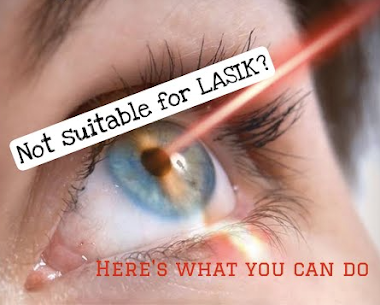Can I do LASIK Twice?
Yes, it is possible to have LASIK surgery twice. However, it is rare for people to need the procedure more than once. Most individuals under suitable, long-lasting, improved vision after just one surgery. Age-related changes in vision, rather than other age-related changes. Another flap will be created during this second procedure to improve your vision and further prevent future changes or loss of vision; it can only correct your current vision.
Those individuals who require a second LASIK surgery typically will only need it many years after their initial procedure. It's crucial to understand that only some are suitable candidates for repeat surgery. The surgeon who performed your first LASIK will be able to assess whether you are eligible for a second round. Your suitability will depend on factors such as your age, overall health condition, and the structure of your eyes.
Why You Might Need LASIK Twice?
LASIK, a procedure that has brought happiness to millions of people, is often considered a long-lasting solution for vision problems. However, it's important to understand that LASIK does not address all vision errors. While LASIK focuses on reshaping the cornea and correcting refractive errors, other age-related conditions like presbyopia or cataracts can still affect patients even after undergoing LASIK. These issues have nothing to do with the cornea and are not addressed during the initial LASIK procedure.
It may come as a surprise, but many vision changes occur as early as 40 years old. Conditions like cataracts or glaucoma could silently develop without you even realizing it. In cases where refractive errors were not fully corrected during the first LASIK procedure, a second surgery may be necessary. Another flap will be created during this second procedure to improve your vision further. However, it's worth noting that most surgeons prefer to wait 5-10 years before performing a second LASIK procedure to ensure the best results and minimize potential risks.
It's Your Aging Eyes, Not LASIK?
As we age, our eyes undergo various changes that affect our vision and clarity. One common change is the development of cataracts, which can cause a gradual loss of eyesight. Unfortunately, LASIK surgery cannot correct cataracts because they specifically impact the eye's natural lens, whereas LASIK reshapes the cornea. The lens is a different part of the eye altogether. So, it won't be possible if someone with cataracts demands a second LASIK procedure to restore their clear vision.
However, there is still hope for those seeking to regain clear vision after cataract surgery. One potential solution is a premium IOL (intraocular lens), which may be the best choice for such patients. On the other hand, presbyopia is another age-related change affecting our eyes. This condition occurs as our eyes gradually lose their ability to focus properly. That's why many people who are forty years or older start using reading glasses to see more clearly. If someone already has cataracts and suffers from presbyopia, undergoing LASIK twice would not help or improve. Presbyopia causes the eye's lens to thicken and lose flexibility, similar to how cataracts affect the lens. Therefore, just like cataract surgery, LASIK cannot effectively address vision problems caused by presbyopia.
Is LASIK safe?
Many people wonder if LASIK eye surgery is safe. The good news is that clinical trials and research studies have shown that it is indeed a safe procedure. Over 9,000 individuals participated in clinical trials conducted in the United States between 1993 and 2005, proving its safety. Additionally, more than 7,000 research studies have confirmed the safety of LASIK.
It's important to note that while LASIK has proven safe for most individuals, like any surgical procedure, it carries some risks. This is why it's crucial to consult with an ophthalmologist or optometrist who can provide detailed information about LASIK and help determine whether the benefits outweigh the risks in your case. For instance, if you have certain medical conditions, such as damaged corneas or chronic conditions that affect healing, LASIK may not be a viable option. It can be disappointing to find out that you're not a suitable candidate for the surgery you were hoping to undergo but remember that eye doctors prioritize your safety above all else. By seeking their guidance, you can make informed decisions about your eye health and explore alternative options that suit your needs.
What is the LASIK eye surgery recovery time?
LASIK eye surgery recovery time is relatively short, and most people can restart their normal activities within a few days. This means that you can go back to work or even drive after undergoing the procedure, but it is important to exercise caution before getting behind the wheel. One common side effect of LASIK is blurred vision, which can affect your ability to see clearly while driving. It would be best to wait until your vision has fully cleared before operating a vehicle.
Taking the necessary precautions during recovery is crucial to ensure a successful outcome. While the recovery time for LASIK is quick, it is important to remember that everyone's healing process is unique. Some individuals may experience faster recovery than others. Therefore, following your doctor's instructions and guidelines regarding post-operative care is always best.
What would disqualify me from LASIK?
LASIK, or laser-assisted in situ keratomileusis, is a popular and effective procedure that corrects vision problems. However, it's important to note that only some are suitable candidates for LASIK. Approximately 1 in 5 people who desire LASIK are disqualified due to certain medical or eye conditions.
One condition that may disqualify you from LASIK is unstable vision. Another factor that might prevent you from undergoing LASIK is extreme nearsightedness, farsightedness, or astigmatism. These refractive errors can be more effectively addressed through alternative procedures tailored to specific needs.
Also, not having thick corneas for the LASIK procedure could disqualify you. The thickness of the cornea plays a crucial role in determining whether LASIK is a viable option for vision correction. Furthermore, individuals suffering from severe dry eye disease may face complications during and after the procedure, which could lead to unsatisfactory outcomes. Therefore, it's essential to have stable tear production before considering LASIK.
Another condition that may make you ineligible for LASIK is keratoconus, a progressive thinning disorder of the cornea that distorts vision. Due to its unpredictable nature, LASIK is not recommended for individuals with this condition. Similarly, if you have cataracts or a clouding of the eye's natural lens, LASIK may not be suitable as it doesn't address this issue. Instead, cataract surgery would be more appropriate.
Moreover, certain systemic diseases such as glaucoma, diabetes, or autoimmune diseases that are difficult to manage can also disqualify you from LASIK. These conditions require careful monitoring and control of symptoms, and the potential risks associated with LASIK may outweigh the benefits in such cases.
Benefits of LASIK
The benefits of LASIK are truly remarkable. One of the most striking advantages is how quick and efficient the procedure is. In just ten minutes per eye, you can experience a life-changing improvement in your vision. It's astonishing to think that such a transformative process can be completed in such a short amount of time.
Not only is LASIK fast, but it is also described by patients as painless. This is due to using gentle ultra-precise light energy instead of traditional blades. This advanced technology makes the healing process natural and effective, eliminating the need for stitches. LASIK can deliver exceptional results without causing discomfort or requiring invasive measures, which speaks volumes about its effectiveness and efficiency.
However, it's important to note that achieving the best possible outcomes from LASIK does require some post-operative care. To ensure optimal healing and long-term success, it is recommended to use lubricating and antibiotic drops for several weeks following the treatment. These drops help keep the eyes moisturized and prevent infection, ultimately enhancing overall recovery.
In conclusion, LASIK offers numerous benefits, making it an attractive option for those seeking to make their vision better.




Comments
Post a Comment